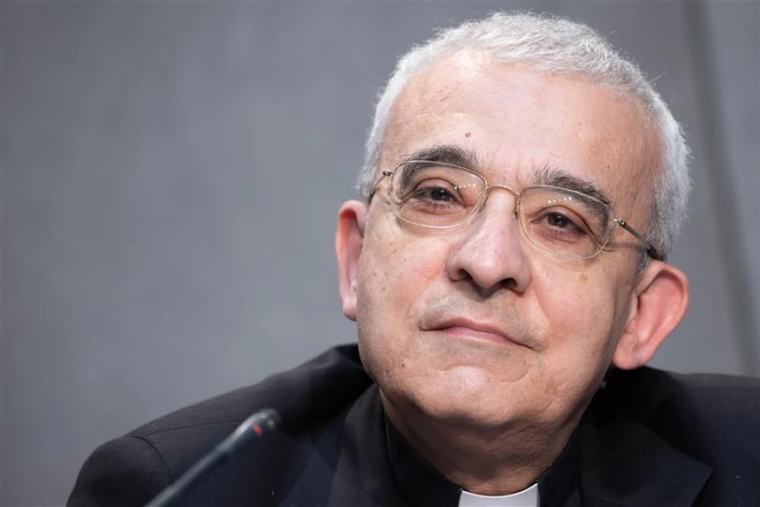ANALYSIS: The Carmelite canonist’s selection suggests continuity — and a clear direction on synodality.
Pope Leo XIV’s first governing move is somewhat surprising. Yet it could also signal a step forward for synodality in general, and for the German Synodal Path in particular.
Archbishop Filippo Iannone, chosen by Leo to succeed him as head of the Dicastery for Bishops, was part of the team that — along with Cardinals Pietro Parolin, Kurt Koch, and Robert Prevost (now Pope Leo) — engaged the German bishops in various meetings at the Vatican on the Synodal Path in Germany.
Before looking at the background, a profile of Archbishop Iannone is in order. A renowned jurist, methodical and consistent in his thinking, he most recently served as prefect of the Dicastery for Legislative Texts. A Carmelite priest since 1982, Iannone was appointed auxiliary bishop of Naples in 2001, serving alongside Cardinal Michele Giordano, then archbishop of Naples. At the time, he was the youngest bishop in Italy. He was later appointed vicegerent (deputy vicar general) of the Diocese of Rome by Cardinal Agostino Vallini, vicar general, who had also served in Naples.
While Cardinal Vallini worked as auxiliary and vicar general to Cardinal Giordano in Naples from 1989 to 1999, also organizing St. John Paul II’s visit to the city, Iannone held key positions in the diocese: judge and deputy judicial vicar at the diocesan tribunal, episcopal vicar for the fourth pastoral zone, and vicar general.
Their collaboration and friendship began in those years. Cardinal Vallini was later appointed bishop of Albano, while Bishop Iannone became auxiliary bishop of Naples in 2001. In 2009, Bishop Iannone became the bishop of Sora-Aquino-Pontecorvo and remained there until 2012, when Benedict XVI appointed him vicegerent of Rome.
Pope Francis appointed him adjunct secretary of the Dicastery for Legislative Texts in 2017 and made him prefect of the same dicastery in 2018.
Archbishop Iannone is doctrinally sound and has a reserved (some might say shy) nature. He follows directives precisely and is not one to rush forward or retreat from his decisions.
Leo XIV thus chose a “soft” continuity for the dicastery, confirming the rest of the team: Archbishop Ilson Montanari as secretary and Msgr. Ivan Kovač as undersecretary. This was a surprising choice, given the rumors that Archbishop Montanari had discussed appointments directly with Pope Francis, bypassing Cardinal Prevost. But the choice reflects the Pope’s character — not one inclined to grand “spoils systems,” but rather toward absorbing divisions and crises.
Ultimately, even if the secretary had taken liberties under Pope Francis, he won’t be able to do so under Archbishop Iannone. At the same time, no one is being given a new episcopal office to decide on independently; there’s no so-called promoveatur ut amoveatur (“promote to demote”).
But with the choice of Archbishop Iannone, Leo XIV also signaled a clear direction. On the issue of synodality, the Pope spoke extensively in an interview for the book Leo XIV: Citizen of the World, Missionary of the 21st Century by Elise Ann Allen. He described synodality as “an attitude, an openness, a willingness to understand. This means that every single member of the Church has a voice and a role to play, through prayer, reflection, and a process. There are many ways in which this could happen, but only through dialogue and mutual respect.”
This is a setback for the German Synodal Path, which, after the election of Leo XIV, saw the departure of four bishops.
The choice of Archbishop Iannone, however, confirms Leo’s approach. In the regular Vatican meetings between the German bishops and the heads of dicasteries from 2022 until 2024, Archbishop Iannone was part of a “dream team” with Cardinals Parolin, Koch, Prevost and Arthur Roche. He earned recognition for his balance and his ability to manage tensions. In one instance, L’Osservatore Romano published reports to clarify the Holy See’s positions.
At that time, Archbishop Iannone acted as a liaison between the various dicasteries. He provided the necessary legal materials, helped Cardinals Parolin and Koch better formulate their points of view for the debate, and managed to reconcile Pope Francis’ desire to demonstrate openness to the synodal process while balancing the need to safeguard doctrine.
Beginning Oct. 15, when he starts handling episcopal nominations, Archbishop Iannone will be called upon to bring this approach of dialogue and firmness, drawing on both his experience as a bishop and his expertise as a canonist. The dicastery is passing from the hands of one canonist to those of another — itself an important signal.
